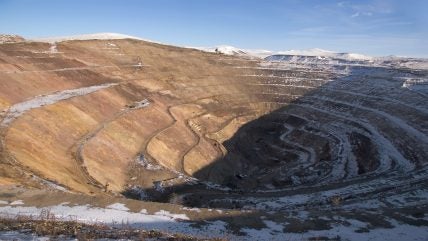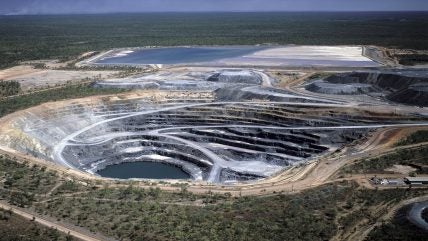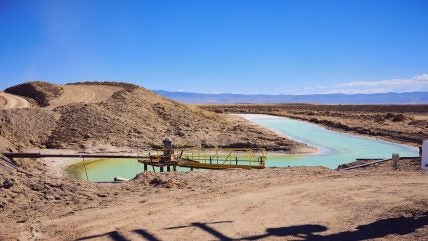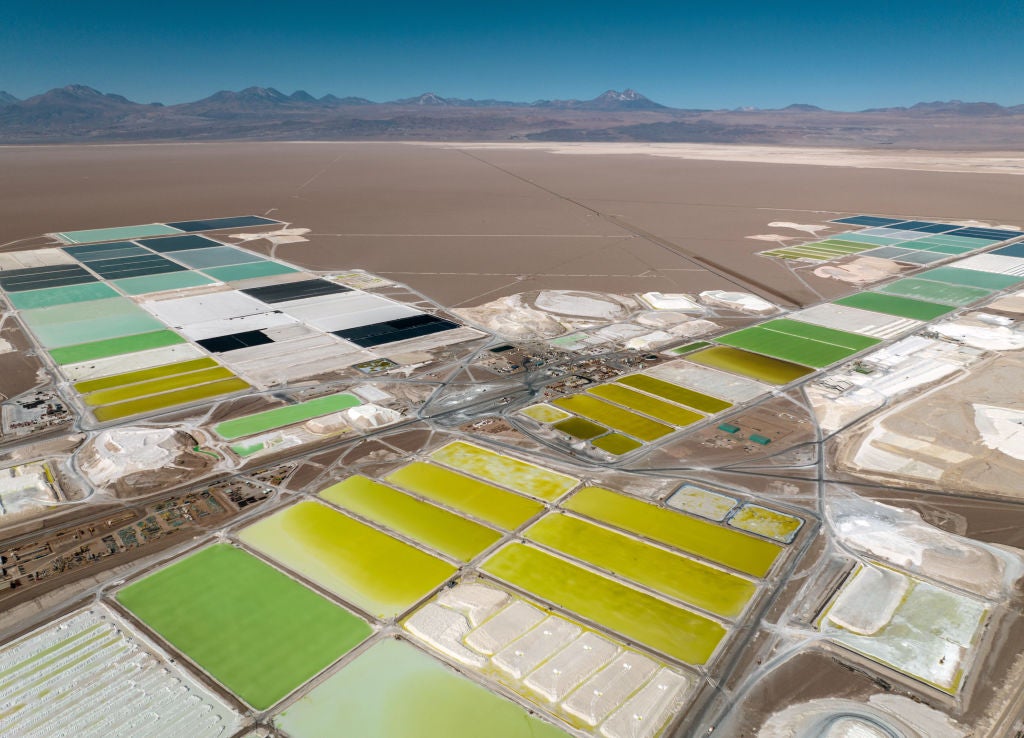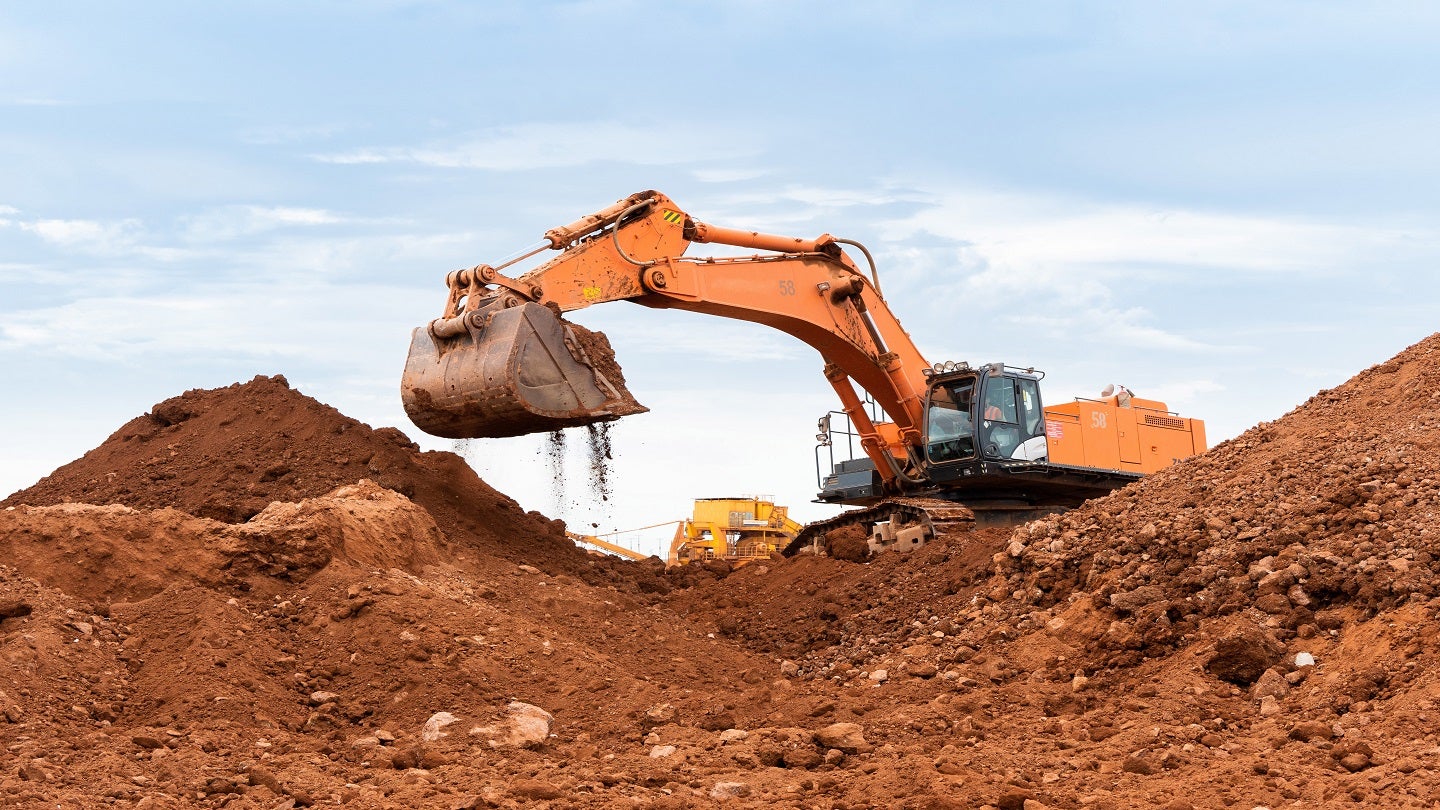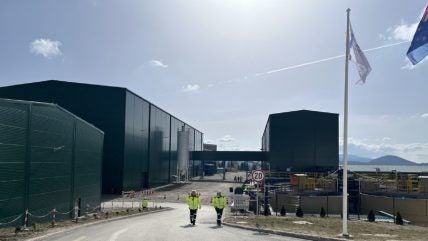NUKE NEWZ
UK government buys Wylfa and Oldbury nuclear sites from Hitachi
06 March 2024
An agreement to buy the Hitachi-owned sites for new nuclear at Wylfa in north Wales and Oldbury-on-Severn in southwest England has been reached for GBP160 million (USD203 million), Chancellor Jeremy Hunt has announced.
.jpg?ext=.jpg) Hitachi pulled out of plans for a nuclear project at Wylfa in 2020 (Image: Horizon Nuclear Power)
Hitachi pulled out of plans for a nuclear project at Wylfa in 2020 (Image: Horizon Nuclear Power)The two sites are expected to be prioritised for new nuclear as the UK seeks to expand nuclear energy capacity. Hunt, delivering the annual Budget speech to Parliament, said the purchase had been made "given the importance of securing nuclear sites for the success of the nuclear programme".
The UK government aims to grow nuclear energy capacity to 24 GW by 2050, with a fleet of small modular reactors (SMRs) a key part of that strategy. Last year, the government and the new Great British Nuclear arms-length body set up to help deliver that extra capacity began the selection process for which SMR technology to use. In October, EDF, GE Hitachi Nuclear Energy, Holtec, NuScale Power, Rolls Royce SMR and Westinghouse were invited to bid for UK government contracts in the next stage of the process.
Hunt said that as well as seeking a site for a new GW-scale nuclear plant, "the government is now moving to the next stage of the SMR process, with six companies invited to submit their initial tender responses by June this year". He added that "no decisions have been taken on projects".
In an interview with World Nuclear News in January, Great British Nuclear Chairman Simon Bowen said that they were looking to get access to the existing earmarked nuclear sites in the country "like Oldbury, Wylfa, Heysham, Hartlepool and the others ... those are recognised nuclear sites which we can build on at scale - the SMR programme is all about scale and getting as quickly as we can to deliver on energy security and on the journey to net-zero".
The Horizon Project was to develop two UK Advanced Boiling Water Reactor units at Wylfa Newydd with the intention to develop Hitachi's nuclear business in the UK but it decided to suspend the project in January 2019, from the viewpoint of its "economic rationality as a private company" because it was clear that further time was needed to decide on a financing structure for the project, and the conditions for building and operating the nuclear power plants.
Tom Greatrex, CEO of the UK's Nuclear Industry Association, said: "This is a pivotal moment for the future of nuclear in the UK and should mark the beginning of new projects at these sites. Wylfa is one of the very best sites for new nuclear anywhere in Europe and there is great promise for a series of SMRs at Oldbury. The success of ramping up nuclear capacity for energy security and net zero rests a great deal on whether we develop at these sites and others."
IAEA's Grossi holds talks with President Putin in Sochi
06 March 2024
International Atomic Energy Agency Director General Rafael Mariano Grossi has discussed nuclear safety and security at Zaporizhzhia nuclear power plant in a meeting with Russian President Vladimir Putin. He also held talks with Rosatom's director general and Russian diplomatic and military representatives.
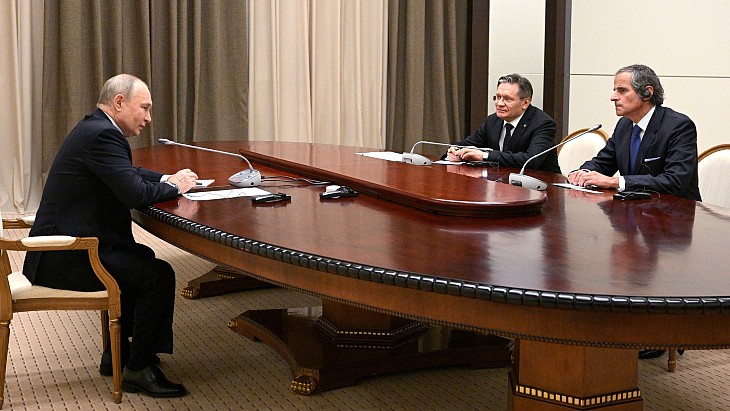 Putin, left, Grossi, right, with Likhachev (Image: Kremlin.ru)
Putin, left, Grossi, right, with Likhachev (Image: Kremlin.ru)
The Russian President's media service's transcript of the opening of the meeting quotes Putin as saying Russia is an "undisputed leader" in terms of cooperation with the International Atomic Energy Agency (IAEA): "We do not only operate, but also actively develop, the nuclear energy sector and consider it to be the environmentally-friendly kind of energy. We are doing everything to increase security at nuclear power facilities."
He added: "As you know, we are doing quite a lot of work in this regard in the international arena, and with your help and support we are implementing numerous projects in many countries around the world ... we are ready for further work in all these areas, we are grateful for your reciprocal steps to strengthen our joint work and, of course, we are ready to discuss any issues that you consider relevant. I know that you have particularly sensitive and important issues on the agenda of our meeting today, and we, of course, are ready to discuss them and do everything to ensure security at any point where we are somehow involved to nuclear energy."
He also noted a range of different Russian nuclear energy developments - including small modular reactors, a nuclear fleet and floating nuclear power plants - and said "all of this is in great demand ... and we are ready to share our developments with all our interested partners".
The published transcript of the opening remarks quote Grossi as saying "it's very important for me to be here. We first talked in St Petersburg a year and a half ago ... it seems to me that everything that has happened since then further demonstrates the timeliness of this conversation. I agree, these are very important times, there are challenges, and we will discuss these challenges".
He also posted on the social media platform X, calling it an "important exchange with the President of the Russian Federation Vladimir Putin in Sochi, on the nuclear safety and security of #ZNPP (Zaporizhzhia nuclear power plant) and other non-proliferation global challenges".
Russia's state nuclear corporation Rosatom said the first meeting during Grossi's visit took place with Rosatom Director General Alexey Likhachev, the head of nuclear regulator Rostechnadzor Alexander Trembitsky, the Permanent Representative to the international organisations in Vienna Mikhail Ulyanov and representatives of the Ministry of Foreign Affairs, the Russian Armed Forces and the National Guard.
A Rosatom statement said: "During the consultations, a wide range of issues was addressed, including those pertaining to prospective tracks of nuclear energy development in Russia and worldwide. The main emphasis of the talks was placed on the issues relating to ensuring nuclear safety and security of the Zaporizhzhia plant ... Alexey Likhachev outlined measures being taken by the Russian side to ensure safe operation ... he also touched upon certain aspects of interaction with the IAEA experts at the plant."
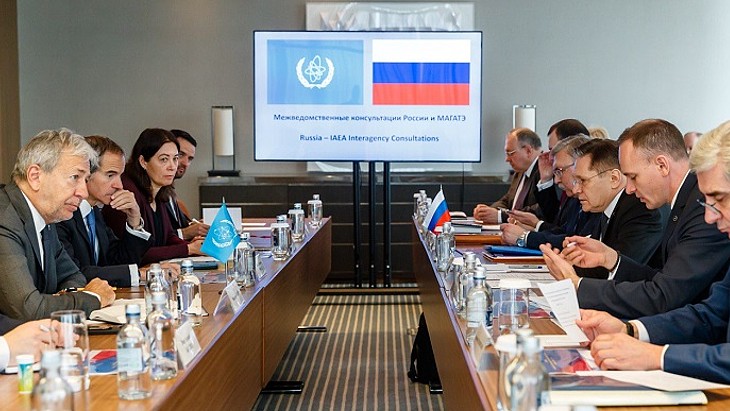
Grossi, second left, started the visit holding talks with Likhachev (third right) (Image: Rosatom)
It said that Grossi had talked about his recent visit to the Zaporizhzhia plant and "the parties confirmed their agreement to continue contacts".
Grossi visited Kiev and met Ukraine's President Volodymyr Zelensky last month, ahead of his most recent visit to the six-unit Zaporizhzhia plant, which is the largest in Europe, and which has been under Russian military control since early March 2022. It is on the frontline of Ukrainian and Russian forces. In a report to the IAEA board of governors earlier this week, Grossi said the safety and security situation at the plant remained precarious.
Holtec and Hyundai E&C partner with British firms to advance UK SMR bid
06 March 2024
South Korea's Hyundai Engineering & Construction, the USA's Holtec International and British construction company Balfour Beatty and engineering firm Mott McDonald have agreed to cooperate on Holtec's bid to construct a small modular reactor in the UK.
.jpg?ext=.jpg) The signing of the agreement (Image: Hyundai E&C)
The signing of the agreement (Image: Hyundai E&C)
The UK government has plans to expand nuclear energy capacity to 24 GW by 2050, with a fleet of SMRs a key part of that strategy. Last year, the government and the new Great British Nuclear (GBN) arms-length body set up to help deliver that extra capacity began the selection process for which SMR technology to use. In October, EDF, GE Hitachi Nuclear Energy, Holtec, NuScale Power, Rolls Royce SMR and Westinghouse were invited to bid for UK government contracts in the next stage of the process.
"We are at the final stages now of preparing and getting the approvals for the invitation to submit an initial tender document," GBN chairman Simon Bowen told WNN in January. "This is the next stage where all six companies will engage with our contractual documentation in terms of how we think it should be structured. They'll submit the responses in their initial tender, we will then go through a process to down-select to around about four with the aim to be placing contracts later in the year."
Hyundai E&C and Holtec - referred to as Team Holtec - have now signed an agreement with Balfour Beatty and Mott McDonald to jointly participate in the UK SMR technology competition.
The agreement was signed on 5 March at the Korean Embassy in London in the presence of Korean Ambassador to the UK Yeo-cheol Yoon and John Whittingdale, Britain's special envoy for trade to Korea.
Although specific details about the agreement were not disclosed, Hyundai E&C said the partners "will seek close cooperation in submitting bids for GBN's SMR technology selection project, improving market competitiveness for the final investment selection of SMR deployment in the UK, and establishing strategic partnerships for the future deployment of the first SMR reactor".
"Based on this agreement, Hyundai E&C plans to expand the foundation for its entry into the UK SMR business and at the same time further solidify the foundation for its entry into the global SMR business based on its unrivaled technological capabilities and strong mutual trust," it added.
Balfour Beatty announced in December 2022 that it had signed a memorandum of understanding with Holtec Britain - a subsidiary of Holtec International - to support the planning advancement for the construction of Holtec's SMR-160 in the UK. Under that MoU, Balfour Beatty will act as the main UK construction partner and collaborate with Hyundai E&C on the civil construction and installation of the mechanical, electrical and heating, ventilation and cooling systems as well as the equipment required for Holtec's SMRs.
In December last year, Mott MacDonald was appointed as the delivery partner for the Generic Design Assessment (GDA) of Holtec's larger SMR-300 in the UK. Having successfully supported Holtec Britain in securing GBP30 million (USD38 million) of grant funding from the UK government's Future Nuclear Enabling Fund for the GDA, Mott MacDonald is now providing safety, engineering, environmental, and regulatory support to Holtec Britain throughout the process.
In November 2021, Holtec and Hyundai E&C signed a teaming agreement under which Hyundai E&C will perform the detailed design of the balance of plant and prepare the full plant construction specification for the SMR-160, which Holtec has been developing since 2010. The Korean company will also develop the integrated 3D plant model for construction using its Building Information Modelling management process. The partnership also provides for project delivery rights for Hyundai, subject to certain provisions. In October 2022, the two companies agreed to accelerate the programme to complete the balance of plant design of the remaining systems and structures for the SMR-160.
Holtec's 160 MWe SMR is a pressurised light-water reactor using low-enriched uranium fuel. The design has completed the first phase of the Canadian Nuclear Safety Commission's three-phase pre-licensing vendor design review and is undergoing pre-licensing activities with the US NRC. Holtec has also applied for a Generic Design Assessment of the SMR-160 in the UK. Among the countries it is being considered is Ukraine, with a cooperation agreement signed earlier this year with a target date of supplying power by March 2029, and potentially up to 20 SMRs eventually across the country.
SKB begins construction of Forsmark geology building
06 March 2024
Sweden's radioactive waste management company Svensk Kärnbränslehantering AB (SKB) has announced the breaking of ground for its new geology building, which will be a centre for the collection and evaluation of data from surveys and site monitoring on the Forsmark peninsula.
.jpg?ext=.jpg) The ground-breaking ceremony (Image: Veidekke)
The ground-breaking ceremony (Image: Veidekke)
SKB said the new geology building will be "of great importance for the upcoming major construction projects in Forsmark".
Several of SKB's operations are currently located on the Forsmark Peninsula in Östhammar's municipality, including SFR, the final repository for low and intermediate-level waste, the capacity of which is to be expanded. The final repository for used nuclear fuel from Swedish nuclear power plants is also to be built there.
The geology building - being built by contractor Veidekke - will have two floors, cover about 2000 square metres and, among other things, house a workshop for the survey activities, a storage place for drill cores and field equipment, a chemistry laboratory, modern office spaces and changing rooms. The property is designed with appropriate gates for vehicles and equipment as well as adjacent outdoor staging areas.
.jpg)
How the completed building should look (Image: SKB)
"Great consideration is given to sustainability in the construction of the building, among other things, green concrete with lower carbon dioxide emissions will be used," SKB noted. "The frame and facade will consist of wood and the building will have a so-called sedum roof, a roof with living plants on top of the waterproofing layer. The possibility of electric car charging will also be available."
"We have seen a need to future-proof our premises for upcoming large projects and then it is important for us to build in a sustainable way with consideration for the environment both in construction technology and material selection," said SKB CEO Stefan Engdahl.
He added: "Now the construction phase begins for what we call our green centre on the Forsmark peninsula. As our operations expand, as the expansion of SFR and entrepreneurs establish themselves in the area, several of our operations will be moved to the new premises in the geology building."
Norwegian construction firm Veidekke signed an agreement with SKB in October 2023 to build the geology building under a turnkey contract. The order value totalled about SEK55 million (USD5.3 million).
Construction of the building is expected to be completed in the spring of 2025. During the following summer, existing equipment will then be moved over from the old premises and operations are planned to start in August of the same year.
The SFR repository is situated 60 metres below the bottom of the Baltic Sea and began operations in 1988. The facility comprises four 160-metre-long rock vaults and a chamber in the bedrock with a 50-metre-high concrete silo for the most radioactive waste. Two parallel kilometre-long access tunnels link the facility to the surface. The facility currently has a total final disposal capacity of about 63,000 cubic metres of waste. SKB plans to start work in autumn 2024 to triple the size of the repository, to about 180,000 cubic metres, by excavating six new rock vaults, 240-275 metres long.
SKB submitted applications to build Sweden's first nuclear fuel repository and an encapsulation plant to SSM in March 2011. In January 2022, Sweden's Minister of Climate and Environment announced that construction of the final repository for used nuclear fuel in Forsmark and the associated fuel encapsulation plant in Oskarshamn can proceed. The repository will be used for the disposal of 6000 capsules with a total of 12,000 tonnes of radioactive waste at a depth of about 500 metres.
Orano signs uranium enrichment services contract with ČEZ
06 March 2024
In a contract signed during a visit to the Czech Republic by French President Emmanuel Macron, Orano will supply uranium enrichment services, which will be used at ČEZ's Dukovany nuclear power plant.
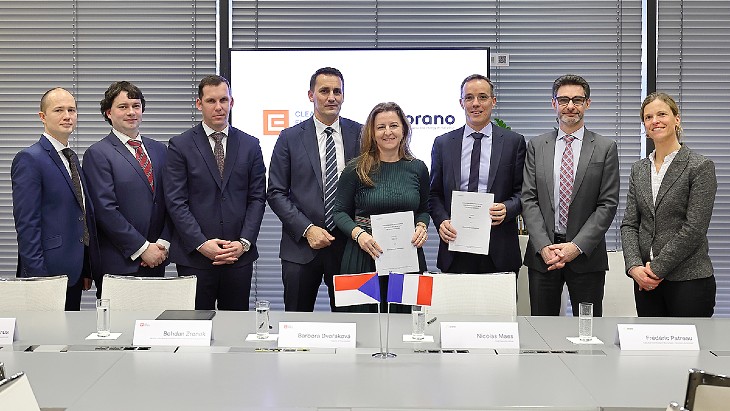 (Image: Orano)
(Image: Orano)
It follows a long-term uranium enrichment contract signed with Orano at the end of 2023 for the Temelín nuclear power plant.
Daniel Beneš, chairman and CEO of ČEZ, said: "Securing a Western provider of uranium enrichment services for Dukovany is not only an important step for the Czech energy industry, but also for the entire Czech Republic. This significantly further strengthens energy security."
Nicolas Maes, CEO of Orano, said: "We are happy to be able to extend our long-term cooperation with our proven customer, ČEZ. This contract is a renewed and solid proof of the confidence of this Czech customer in the know-how and reliability of Orano."
The Czech Republic uses nuclear power for 34% of its electricity, generating this from the four reactors at Dukovany and two at Temelin. Its current new nuclear plans include up to four new units, as well as a possible roll-out of small modular reactors.
Researched and written by World Nuclear News

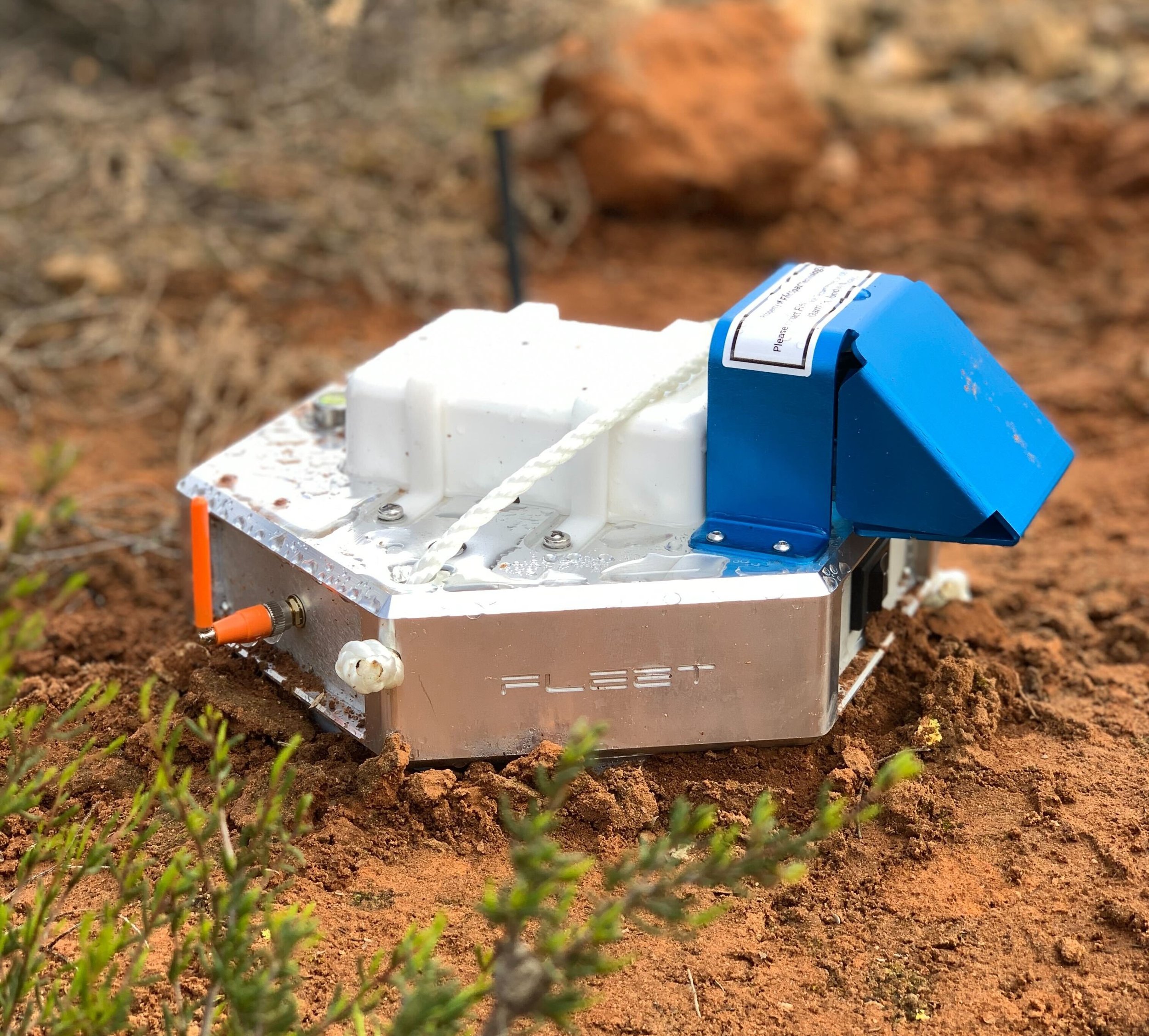

.jpg?ext=.jpg) Hitachi pulled out of plans for a nuclear project at Wylfa in 2020 (Image: Horizon Nuclear Power)
Hitachi pulled out of plans for a nuclear project at Wylfa in 2020 (Image: Horizon Nuclear Power) Putin, left, Grossi, right, with Likhachev (Image: Kremlin.ru)
Putin, left, Grossi, right, with Likhachev (Image: Kremlin.ru)
.jpg?ext=.jpg) The signing of the agreement (Image: Hyundai E&C)
The signing of the agreement (Image: Hyundai E&C).jpg?ext=.jpg) The ground-breaking ceremony (Image: Veidekke)
The ground-breaking ceremony (Image: Veidekke).jpg)
 (Image: Orano)
(Image: Orano)